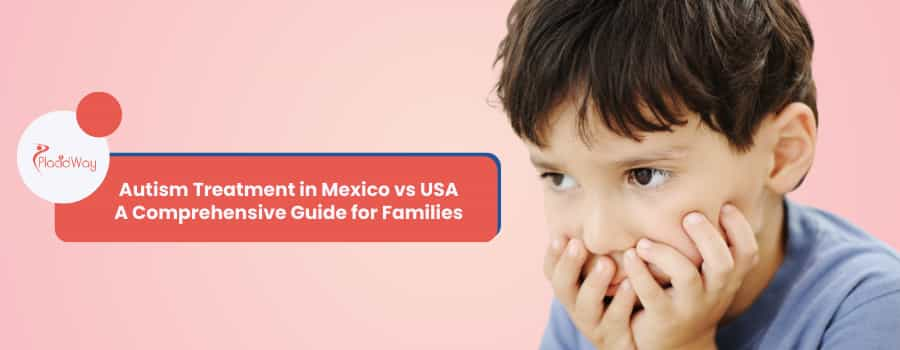
Deciding on the best autism treatment for your child is one of the most significant decisions a parent can make. With the rising prevalence of Autism Spectrum Disorder (ASD) diagnoses, families are increasingly exploring global options to find effective, accessible, and affordable care. This in-depth comparison delves into the nuances of seeking autism treatment in Mexico versus the USA, providing crucial insights into costs, treatment modalities, quality of care, and overall experience to help you make an informed choice.
Choosing the Right Path for Autism Care: Mexico or USA?
For families in the United States, the journey to find comprehensive autism treatment can be fraught with challenges, including high costs, long waiting lists for specialized therapies like Applied Behavior Analysis (ABA), and limited access to certain innovative treatments that may not be FDA-approved. This often leads parents to consider international alternatives, with Mexico emerging as a prominent destination for medical tourism, including autism care.
Mexico offers a diverse landscape of clinics, from those providing established therapies at a lower cost to others specializing in advanced or experimental treatments. The USA, on the other hand, boasts a highly regulated healthcare system, extensive research infrastructure, and a broad network of accredited specialists and institutions, though often at a premium price. Understanding the unique strengths and potential drawbacks of each country is paramount for parents seeking the best possible outcomes for their children with autism.
Autism Treatment Comparison: Mexico vs. USA
Core Strengths in Autism Treatment: Mexico vs. USA
Mexico's Key Capabilities in Autism Therapy
Mexico has emerged as a compelling option for autism treatment, primarily due to its cost-effectiveness and the availability of certain therapies that might be less accessible or more expensive in the USA. Many clinics in major cities like Tijuana, Guadalajara, and Cancun offer specialized programs. These often include a mix of traditional behavioral therapies, biomedical interventions, and emerging treatments like stem cell therapy for autism, which are often not readily available or are restricted in the US market outside of clinical trials.
The country's medical tourism infrastructure is well-developed, with many clinics accustomed to catering to international patients, offering services like patient coordination, translation, and accommodation assistance. This makes the logistical aspect of seeking affordable autism treatment in Mexico more manageable for families from abroad. Furthermore, the ability to potentially access intensive therapy programs without the long waiting lists often found in the USA is a significant draw.
USA's Key Capabilities in Autism Therapy
The United States remains a global leader in autism research, diagnosis, and treatment. Its primary strengths lie in its rigorous regulatory environment, ensuring high standards of care and patient safety, especially for evidence-based therapies. The USA boasts a vast network of highly qualified and board-certified professionals across various disciplines—pediatric neurologists, developmental pediatricians, BCBA-certified behavior analysts, speech-language pathologists, and occupational therapists.
Access to advanced diagnostic tools, cutting-edge research, and a wide array of accredited programs, often affiliated with leading universities and medical institutions, provides a robust foundation for comprehensive autism care. While the cost of autism treatment in the USA can be prohibitive, insurance coverage is more prevalent for many established therapies, making them accessible to a wider segment of the population, particularly for therapies like ABA therapy, which is often mandated by state laws for insurance coverage.
Autism Treatment in Mexico: Pros and Cons
Pros of Autism Treatment in Mexico
- Significant Cost Savings: Treatments can be 30-70% less expensive than in the USA, making advanced care more accessible for families on a budget.
- Access to Innovative Treatments: Availability of therapies like stem cell therapy for autism and hyperbaric oxygen therapy (HBOT) that are often experimental or less accessible in the USA.
- Shorter Waiting Times: Quicker access to intensive therapy programs, bypassing long waiting lists common in the US.
- Personalized & Intensive Programs: Many clinics offer highly individualized and intensive treatment schedules tailored to the child's specific needs.
- Medical Tourism Support: Established infrastructure to support international patients with travel, accommodation, and translation services.
- Geographic Proximity: Relatively easy travel for families from the Southern and Western USA.
Cons of Autism Treatment in Mexico
- Variable Quality of Care: The regulatory environment is less uniform than in the USA, necessitating thorough research to find reputable clinics.
- Lack of US Insurance Coverage: Most treatments are out-of-pocket, as US insurance plans typically do not cover international medical care.
- Language and Cultural Barriers: While clinics may offer English services, daily life interactions might present challenges.
- Travel and Logistics: Requires significant planning for international travel, especially with a child with ASD.
- Continuity of Care: Coordinating follow-up care with local providers upon returning home can be complex.
- Experimental Treatments: Some advanced therapies might lack extensive long-term research or FDA approval, requiring careful consideration.
Autism Treatment in USA: Pros and Cons
Pros of Autism Treatment in the USA
- High Standards & Regulation: Strict governmental and professional oversight ensures quality and safety for most treatments.
- Wide Availability of Evidence-Based Therapies: Extensive access to ABA, speech, occupational, and physical therapies backed by robust research.
- Qualified Professionals: Large pool of board-certified and highly trained specialists, often leading in research and best practices.
- Insurance Coverage: Many evidence-based therapies are covered by health insurance, reducing out-of-pocket expenses for families.
- Continuity of Care: Easier to establish long-term care plans and coordinate with multiple specialists within the same healthcare system.
- Accessibility to Research & Trials: Opportunities to participate in cutting-edge clinical trials and benefit from the latest scientific advancements.
Cons of Autism Treatment in the USA
- High Costs: Without robust insurance, treatment costs can be prohibitively expensive, leading to financial strain.
- Long Waiting Lists: Significant wait times for initial diagnostic evaluations and access to high-demand therapies like intensive ABA.
- Limited Access to Certain Treatments: Experimental or alternative therapies not approved by the FDA are generally unavailable outside of clinical trials.
- Insurance Limitations: Coverage can vary greatly, with caps on therapy hours, age limits, or exclusions for certain diagnoses.
- Geographic Disparities: Access to specialized care can be limited in rural areas, requiring travel within the US.
Exploring Diverse Autism Treatment Approaches
Beyond the cost and logistical considerations, the types of treatments available are a critical factor. Both Mexico and the USA offer a range of therapies, but their emphasis and regulatory status can differ significantly:
- Applied Behavior Analysis (ABA) Therapy: Widely considered the gold standard in the USA, ABA therapy for autism is focused on improving specific behaviors, such as communication, social skills, and learning. It is extensively covered by insurance in the USA. In Mexico, ABA is also available, often at a lower cost, though the number of BCBA-certified practitioners may be fewer.
- Biomedical Interventions: These therapies aim to address underlying biological issues that may contribute to autism symptoms, such as gut health, nutritional deficiencies, and inflammation. Mexico has a more liberal approach to these treatments, including specialized diets, supplements, and detoxification protocols. In the USA, these are often viewed as complementary or alternative and may not be covered by insurance.
- Stem Cell Therapy for Autism: This is perhaps the most significant difference. While still largely considered experimental globally, Mexico offers stem cell therapy for autism in several clinics. These treatments aim to regenerate damaged cells or reduce inflammation in the brain. In the USA, stem cell therapy for autism is typically only available through rigorous clinical trials and is not an FDA-approved commercial treatment.
- Speech and Occupational Therapy: Both countries offer these crucial therapies, which focus on improving communication and daily living skills. Quality of care can be high in both, though USA typically has more standardized certification.
Families must weigh the potential benefits and risks of each treatment approach, particularly for those that are less established or still in experimental phases. Transparency from clinics regarding methodologies, success rates, and potential side effects is vital.
Navigating the International Patient Journey for Autism Care
The Mexico Experience: Focus on Support
When seeking autism treatment for children in Mexico, families often encounter clinics that are well-versed in the needs of international patients. This includes providing dedicated patient coordinators who speak English, assisting with travel arrangements, and offering local accommodation recommendations. The atmosphere can be more personalized, with a strong emphasis on family integration into the treatment process. Many parents appreciate the comprehensive packages that can include therapies, medical consultations, and even some travel logistics, simplifying the overall process of seeking special needs care in Mexico.
The USA Experience: Focus on Integration
In the USA, the experience is typically centered around integrating treatment into the child's daily life within their existing community and school system. This means working with local therapists, school-based programs, and pediatricians. The focus is often on long-term, consistent intervention delivered close to home. While less emphasis is placed on "medical tourism" support, families benefit from established frameworks for special education, disability services, and community support groups that can provide ongoing assistance for children with ASD and their families.
For families considering medical tourism for autism, thorough preparation is crucial. This includes obtaining all relevant medical records, understanding visa requirements (though US citizens often don't need a visa for short medical stays in Mexico), and planning for extended stays if intensive therapies are chosen. It's also vital to consider how treatment will continue once the family returns home. Many Mexican clinics offer remote consultations, but establishing a local support network for ongoing care remains important.
Real Stories from Families
Maria & John, California, USA
"After years of frustration with insurance battles and limited ABA hours in the US, we looked to Mexico. Our son received intensive biomedical and behavioral therapies that weren't available to us back home, and at a fraction of the cost. The difference in his communication skills is undeniable."
Amanda, Texas, USA
"My daughter has severe autism, and we were desperate for effective treatments. We opted for stem cell therapy in Mexico, combined with intensive traditional therapies. It was a leap of faith, but we've seen improvements in her eye contact and awareness. The clinic staff were incredibly supportive."
Kevin & Lisa, New York, USA
"While the USA offered great ABA therapy, we couldn't afford the amount our son needed without insurance. We found a clinic in Mexico that provided intensive ABA and speech therapy for a fraction of the price. It allowed us to give him the consistent support he needed during a critical developmental period."
David, Washington, USA
"For our family, the highly structured and regulated environment of US clinics was paramount. We found a fantastic university-affiliated center for our son's diagnosis and ongoing ABA. The consistency and ease of working with our insurance made the higher cost justifiable for us."
Frequently Asked Questions About Autism Treatment
Is autism treatment in Mexico safe and effective?
Yes, many clinics in Mexico offer safe and effective autism treatments, adhering to international standards. It's crucial to research and choose reputable, accredited clinics with experienced professionals. Success varies based on treatment type and individual needs.
How much cheaper is autism treatment in Mexico compared to the USA?
Autism treatment costs in Mexico can be significantly lower, often 30-70% less than in the USA, depending on the specific therapies (e.g., ABA, biomedical, stem cell), clinic, and duration of treatment. This includes costs for procedures, therapies, and sometimes accommodations.
What types of autism therapies are available in Mexico?
Mexico offers a range of autism therapies, including Applied Behavior Analysis (ABA), speech therapy, occupational therapy, biomedical treatments, nutritional interventions, hyperbaric oxygen therapy (HBOT), and increasingly, experimental treatments like stem cell therapy. Always ensure chosen therapies are evidence-based.
Does US insurance cover autism treatment in Mexico?
Generally, most US-based health insurance plans do not directly cover treatments received abroad, including in Mexico. However, some plans might offer partial reimbursement for certain elements, or families might use health savings accounts (HSAs) or flexible spending accounts (FSAs). It's essential to check with your specific insurance provider.
What are the common challenges of seeking autism treatment in Mexico?
Challenges can include potential language barriers outside of international clinics, the need for thorough vetting of clinics and therapists, travel logistics, adjusting to a new cultural environment, and ensuring continuity of care upon returning home. It's important to prepare for these aspects.
What should I look for in an autism treatment clinic in Mexico?
Look for clinics with clear accreditations, highly qualified and certified specialists (e.g., BCBAs for ABA), transparent success rates, clear communication in your preferred language, comprehensive treatment plans, patient testimonials, and a focus on evidence-based practices. PlacidWay can assist in vetting.
How long should we plan to stay in Mexico for autism treatment?
The duration depends on the treatment type and intensity. For intensive therapies like ABA, stays can range from several weeks to months. For specific procedures like stem cell therapy, it might be shorter, often a few days to a week, with follow-up protocols. Always consult the clinic for a recommended timeline.
Are there legal differences regarding autism treatment between Mexico and the USA?
The legal and regulatory frameworks for medical treatments, especially experimental ones, can differ significantly. The USA has strict FDA regulations for certain therapies, which may not apply in Mexico, allowing for more experimental options. Always be aware of the regulatory landscape for your chosen treatment.
How do I ensure quality of care for my child with autism in Mexico?
To ensure quality care, select clinics that are internationally accredited (e.g., JCI), have transparent credentials for their staff, provide individualized treatment plans, offer clear communication channels, and have positive patient feedback. Utilizing medical tourism facilitators like PlacidWay can also help in vetting clinics.
What support is available for families traveling for autism treatment?
Many international clinics offer support services such as airport transfers, accommodation assistance, translation services, and patient coordinators to help manage logistics. Medical tourism companies like PlacidWay provide comprehensive support, including clinic selection, travel planning, and ongoing communication.
Ready to Explore Autism Treatment Options for Your Child?
Choosing the right path for your child's autism treatment is a profound decision, balancing quality, cost, and accessibility. This guide aims to empower you with critical information, but your family's unique needs and circumstances will dictate the best approach.
At PlacidWay, we understand the complexities and emotional weight of this journey. We are dedicated to connecting families with world-class, pre-vetted autism treatment centers in Mexico, the USA, and other leading destinations. Our experienced Care Team provides free, no-obligation consultations to help you compare personalized treatment packages, understand transparent pricing, and answer all your specific questions about autism spectrum disorder treatment options.
Let PlacidWay simplify your search for the best autism treatment, so you can focus on your child's well-being and progress.






.png)

.png)
.png)
.png)
.png)






Share this listing